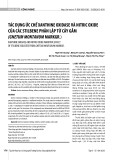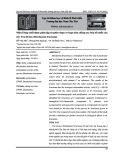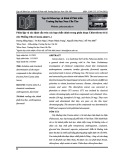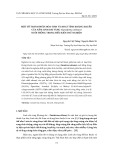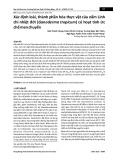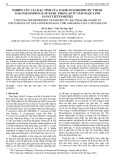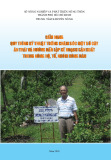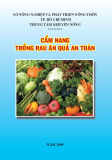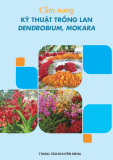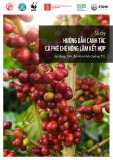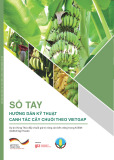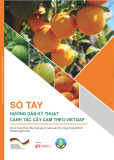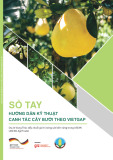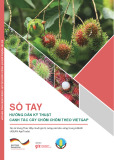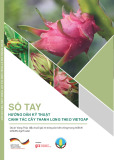
Trường Đại học Nông Lâm TP. Hồ Chí Minh 45
Tạp chí Nông nghiệp và Phát triển 23(5) www.jad.hcmuaf.edu.vn
Evaluation of fermentative activities of yeasts isolated from guava fruit (Psidium guajava L.)
Nhu Q. Lam, Dat Q. Le, Thien D. Nguyen, Minh N. Le, Phong V. Nguyen, & Thanh T. L. Bien*
Faculty of Biological Sciences, Nong Lam University, Ho Chi Minh City, Vietnam
ARTICLE INFO ABSTRACT
Research Paper
Received: December 11, 2023
Revised: April 02, 2024
Accepted: April 15, 2024
Keywords
Evaluation
Fermentation
Guava
Isolation
Yeast
*Corresponding author
Bien Thi Lan Thanh
Email:
bienthilanthanh@hcmuaf.edu.vn
The study was conducted to isolate and screen yeast strains
having good fermentative activities for wine production from
guava (Psidium guajava L.). Yeasts were isolated from 22 samples
of ripe guava fruits (including 4 varieties: Cattley, Taiwan, Ruby
Supreme and Queen), which were collected from 6 provinces in
the Mekong Delta. The yeast isolates were examined for biological
characteristics, including colonial morphology and cell shape, after
48 h of culture, and investigated for fermentative characteristics
including production of H2S gas, temperature and ethanol tolerance,
ability to flocculate, production of extracellular enzymes, and
fermentation of carbohydrate sources. The results showed that 33
yeast strains were isolated based on colony and cell morphologies.
There were 9 isolates from the Taiwan variety, 13 isolates from the
Queen variety, 7 isolates from the Cattley variety, and 4 isolates
from Ruby supreme. Ten out of 33 isolates did not produce H2S
gas and had good flocculent ability in the fermentative solution
after 7 days. Among them, the five yeast isolates (named NHCB1,
NHCL4, NHCB4, DLCL1, and NHCB2) had good temperature
tolerance at 39°C - 43°C, and high ethanol tolerance at 6% - 8%
within 24 h. Three isolates (NHCL4, NHCB2, and NHCB4) with
good ability to ferment glucose and fructose were selected for
sequencing. The internal transcribed spacer sequences of all three
strains were identical to those of Hanseniaspora opuntiae (> 99%
identity). Briefly, this yeast strain can tolerate ethanol, ferment,
and produce an appealing smell, bringing the potential for the
production of wine or other fermented products.
Cited as: Lam, N. Q., Le, D. Q., Nguyen, T. D., Le, M. N., Nguyen, P. V., & Bien, T. T. L. (2024).
Evaluation of fermentative activities of yeasts isolated from guava fruit (Psidium guajava L.). The
Journal of Agriculture and Development 23(5), 45-60.

46 Trường Đại học Nông Lâm TP. Hồ Chí Minh
Tạp chí Nông nghiệp và Phát triển 23(5) www.jad.hcmuaf.edu.vn
nguyên liệu cùng với cải tiến nguồn men giống
nhằm nâng cao chất lượng sản phẩm giữ vai trò
vô cùng quan trọng. Nguồn nấm men đóng vai
trò then chốt trong quá trình sản xuất rượu vang,
tạo ra một môi trường lên men ổn định và hiệu
suất cao. Mỗi chủng nấm men sở hữu những đặc
tính riêng biệt, ảnh hưởng đến hương vị, cấu trúc
Đánh giá hoạt tính lên men của các mẫu nấm men phân lập từ quả ổi (Psidium guajava L.)
Lâm Quỳnh Như, Lê Quốc Đạt, Nguyễn Đông Thiên, Lê Nhật Minh, Nguyễn Vũ Phong &
Biện Thị Lan Thanh*
Khoa Khoa Học Sinh Học, Trường Đại Học Nông Lâm TP.HCM, TP. Hồ Chí Minh
THÔNG TIN BÀI BÁO TÓM TẮT
Bài báo khoa học
Ngày nhận: 11/12/2023
Ngày chỉnh sửa: 02/04/2024
Ngày chấp nhận: 15/04/2024
Từ khóa
Khảo sát
Lên men
Nấm men
Phân lập
Quả ổi
*Tác giả liên hệ
Biện Thị Lan Thanh
Email:
bienthilanthanh@hcmuaf.edu.vn
Nghiên cứu được tiến hành nhằm phân lập và tuyển chọn các mẫu
nấm men có các hoạt tính lên men tốt để phục vụ cho nghiên cứu
rượu vang ổi (Psidium guajava L.). Nấm men được phân lập từ
22 mẫu ổi chín (gồm 4 giống: Sẻ, Đài Loan, Trân châu ruột đỏ và
Nữ hoàng) được thu thập tại 6 tỉnh đồng bằng sông Cửu Long.
Các mẫu nấm men phân lập được khảo sát đặc điểm sinh học bao
gồm đặc điểm khuẩn lạc và tế bào sau 48 giờ nuôi cấy; và khảo
sát đặc điểm lên men gồm: khả năng sinh khí H2S, khả năng kết
lắng, khả năng chịu nhiệt và chịu ethanol, khả năng sinh enzyme
ngoại bào và khả năng lên men các nguồn đường khác nhau. Kết
quả đã phân lập được tổng số 33 mẫu nấm men dựa theo những
đặc điểm về khuẩn lạc và tế bào. Trong đó, 9 mẫu từ giống ổi Đài
Loan, 13 mẫu từ giống ổi Nữ hoàng, 7 mẫu từ giống ổi Sẻ và 4 mẫu
từ giống ổi Trân châu ruột đỏ. Sau quá trình khảo sát các đặc điểm
lên men đã tuyển chọn được 10/33 mẫu không sinh khí H2S và
có khả năng kết lắng tốt trong dịch lên men sau 7 ngày. Trong đó,
năm mẫu nấm men kí hiệu NHCB1, NHCL4, NHCB4, DLCL1 và
NHCB2 có khả năng chịu nhiệt tốt ở 39°C - 43°C và chịu ethanol
với nồng độ cao 6% - 8% trong 24 giờ. Qua khảo sát khả năng lên
men các nguồn đường, ba mẫu NHCL4, NHCB2 và NHCB4 có
khả năng lên men với đường glucose và fructose được tuyển chọn
để giải trình tự định danh. Kết quả giải trình tự cho thấy cả 3 mẫu
đều tương đồng cao (> 99%) với Hanseniaspora opuntiae. Đây là
loài nấm men có khả năng chịu ethanol, lên men và tạo mùi hương
tốt mang đến tiềm năng cho việc sản xuất rượu vang hoặc các sản
phẩm lên men khác.
1. Đặt Vấn Đề
Rượu vang là một loại thức uống có độ cồn
nhẹ, giá trị dinh dưỡng cao, hương vị thơm ngon
đặc trưng và có lợi cho sức khỏe khi được sử dụng
một cách điều độ (German & ctv., 2000). Trong
quá trình sản xuất rượu vang, việc đổi mới nguồn

Trường Đại học Nông Lâm TP. Hồ Chí Minh 47
Tạp chí Nông nghiệp và Phát triển 23(5) www.jad.hcmuaf.edu.vn
chế biến quả ổi sau thu hoạch cũng như đa dạng
hóa các sản phẩm thương mại từ quả ổi trên thị
trường nhằm nâng cao giá trị kinh tế cho nông
sản Việt. Tất cả những vấn đề cấp thiết trên, đề tài
được thực hiện nhằm tuyển chọn các mẫu nấm
men có hoạt tính lên men tốt được phân lập từ
quả ổi hướng đến ứng dụng trong lên men rượu
vang ổi.
2. Vật Liệu và Phương Pháp Nghiên Cứu
2.1. Thu mẫu ổi chín và phân lập nấm men
Mẫu quả ổi chín được thu hái trực tiếp, ngẫu
nhiên tại vườn ở các địa phương thuộc 6 tỉnh,
bao gồm: Bến Tre, Đồng Tháp, Long An, Trà
Vinh, Tiền Giang và Cần Thơ. Các giống ổi thu
thập bao gồm: Sẻ, Trân châu ruột đỏ, Đài Loan
và Nữ hoàng. Quả ổi được lựa chọn phải chín,
có màu vàng xanh, trơn bóng, mùi thơm đặc
trưng, độ mềm tương đương nhau và được hái
ngẫu nhiên trên các cây khác nhau trong một
vườn. Mẫu sau khi thu thập được cho vào túi zip
vô trùng, dán nhãn kí hiệu và bảo quản lạnh (<
10°C), vận chuyển về phòng thí nghiệm và phân
tích trong vòng 24 giờ.
Cho 10 g mẫu ổi được cắt nhỏ thành từng lát
có cả phần vỏ và thịt quả vào 90 mL môi trường
YPD (yeast extract, peptone, dextrose) lỏng bổ
sung Chloramphenicol (100 mg/L) đã được khử
trùng (121°C trong 15 phút). Pha loãng 1 mL
dịch ổi đã tăng sinh với 9 mL dung dịch đệm
PBS thành dãy nồng độ 10-1 đến 10-5. Cấy trải 100
µL dịch pha loãng trên môi trường YPD agar có
bổ sung Chloramphenicol (100 mg/L) (Pereira
& ctv., 2014). Sau 48 giờ ủ ở nhiệt độ phòng,
các khuẩn lạc đặc trưng của nấm men có hình
thái khác nhau được chọn lọc và làm thuần đến
khi thu được khuẩn lạc nấm men thuần nhất.
Nhuộm và quan sát đặc điểm hình thái, hình
dạng tế bào các mẫu nấm men dưới kính hiển
vi ở vật kính 100X. Các mẫu nấm men phân lập
được bảo quản trong glycerol 20% và trữ ở -20°C
cho các thí nghiệm tiếp theo.
và độ cồn của rượu vang. Sử dụng nguồn nấm
men tự nhiên được phân lập từ nguyên liệu chính
của quá trình sản xuất rượu vang là một trong
những phương pháp hiệu quả đảm bảo sự đồng
nhất trong quá trình lên men, giữ nguyên được
bản chất tự nhiên của nguyên liệu và giúp tạo ra
sản phẩm có độ cồn cao, chất lượng ổn định và
mùi vị đặc trưng (Pham & ctv., 2019). Chính vì
vậy, những nghiên cứu tuyển chọn nguồn nấm
men tự nhiên mang các đặc tính lên men vượt
trội hứa hẹn trở thành một xu hướng phát triển
được quan tâm trong hiện tại và tương lai.
Việt Nam là một nước có đa dạng về các loại
trái cây, song nguyên liệu dùng để sản xuất rượu
vang hầu như chỉ xoay quanh các loại trái cây
như: nho, dâu, sơ ri. Trong khi đó, ổi (Psidium
guajava L.) là một trong những loại trái cây nhiệt
đới phổ biến, đang được trồng rộng rãi ở nhiều
nơi, nhưng quả chủ yếu dùng để ăn tươi. Thành
phần dinh dưỡng có trong quả ổi chín như một
môi trường lý tưởng cho quần thể nấm men tự
nhiên phát triển vì pH thấp, hàm lượng đường
cao, giàu các loại acid hữu cơ, protein, pectin, các
loại vitamin và khoáng chất (Kamath & ctv., 2008;
Qin & ctv., 2017). Đây là những thành phần đặc
trưng vốn có để sử dụng cho sản xuất rượu vang.
Nhiều nghiên cứu đã tập trung vào việc phân lập,
tuyển chọn và ứng dụng chủng nấm men phù
hợp cho từng loại trái cây, nhằm tạo ra những
sản phẩm rượu vang đặc trưng như rượu vang
khóm (Nguyen & ctv., 2013), rượu vang thanh
long (Ho, 2011), rượu vang dưa hấu (Ngo & ctv.,
2011). Tuy nhiên, lĩnh vực sản xuất rượu vang từ
ổi còn khá hạn chế về mặt nghiên cứu, đặc biệt
là việc xác định chủng nấm men thích hợp cho
quá trình lên men. Vì vậy, có thể thấy rằng quả ổi
vừa là một nguồn nguyên liệu lên men rượu vang
triển vọng, vừa là một nguồn cung cấp men giống
tiềm năng cho sản xuất. Trên hết, lên men rượu
vang từ quả ổi còn là một phương pháp giúp tận
dụng hiệu quả nguồn nguyên liệu dồi dào sẵn có.
Từ đó, góp phần giải quyết các vấn đề khó khăn
về thị trường tiêu thụ, hạn chế trong bảo quản và

48 Trường Đại học Nông Lâm TP. Hồ Chí Minh
Tạp chí Nông nghiệp và Phát triển 23(5) www.jad.hcmuaf.edu.vn
2.2. Khảo sát hoạt tính lên men của các mẫu
nấm men phân lập
2.2.1. Khảo sát khả năng sinh khí hydrogen
sulfide (H2S)
Khuẩn lạc đơn của các mẫu nấm men phân
lập được nuôi cấy trên môi trường Luria Agar
(LA) ở 30°C trong khoảng 7 ngày. Xác định khả
năng sinh H2S bằng cách quan sát màu sắc khuẩn
lạc bề mặt môi trường LA (Ono & ctv., 1991;
Guimarães & ctv., 2006). Loại bỏ các mẫu nấm
men sinh H2S.
2.2.2. Khảo sát khả năng kết lắng
Các mẫu nấm men tuyển chọn được tăng sinh
trong 5 mL môi trường YPD lỏng ở 30°C, lắc 120
vòng/phút trong 24 giờ. Hút 500 µL dịch tăng sinh
và đưa vào ống nghiệm chứa 10 mL môi trường
Sabouraud lỏng (18° Brix), ủ tĩnh ở nhiệt độ 30°C
trong 7 ngày. Đo chiều cao của đoạn dịch trong
sau thời gian ủ rồi so sánh với tổng chiều cao
của khối môi trường lên men trong ống nghiệm.
Nếu tỉ lệ giữa chiều cao của đoạn dịch trong so
với chiều cao của khối môi trường lên men dưới
25% (không có khả năng kết lắng), 25% - 50%
(kết lắng yếu), 50% - 75% (kết lắng trung bình) và
trên 75% (kết lắng tốt) (Guimarães & ctv., 2006;
Nguyen & ctv., 2012).
2.2.3. Khảo sát khả năng chịu nhiệt
Hút 500 µL dịch tăng sinh các mẫu nấm men
tuyển chọn và cấy vào ống nghiệm chứa 10 mL
môi trường YPD lỏng và ủ với dãy nhiệt độ lần
lượt từ 30°C, 35°C, 37°C, 39°C, 41°C, 43°C và
45°C trong 24 giờ. Xác định sự tăng trưởng của
nấm men bằng cách đo mật độ quang (OD) của
dịch tăng sinh ở bước sóng 600 nm tại hai thời
điểm trước khảo sát (0 giờ) và sau khảo sát (24
giờ). Song song đó, cấy ria các chủng nấm men
phân lập lên môi trường YPD agar và ủ ở các
nhiệt độ khác nhau trong 24 giờ. Quan sát sự tạo
thành khuẩn lạc của các chủng nấm men khác
nhau trên đĩa thạch để tuyển chọn các chủng
nấm men có khả năng phát triển mạnh trên môi
trường ở nhiệt độ cao (Doan, 2020).
2.2.4. Khảo sát khả năng chịu ethanol
Hút 500 µL dịch tăng sinh các mẫu nấm men
vào từng ống nghiệm chứa 10 mL môi trường
YPD lỏng có bổ sung ethanol tinh khiết thành
các nồng độ 0, 4, 6, 8 và 10% (v/v). Ủ ở nhiệt
độ 30°C, lắc 120 vòng/phút trong 24 giờ. Sự tăng
trưởng của nấm men được xác định bằng cách
đo mật độ quang (OD) của dịch tăng sinh ở bước
sóng 600 nm tại hai thời điểm trước khảo sát (0
giờ) và sau khảo sát (24 giờ) (Lee & ctv., 2011;
Doan, 2020).
2.2.5. Khảo sát khả năng lên men các loại
đường khác nhau
Các mẫu nấm men tuyển chọn được tăng sinh
trong môi trường YPD, tốc độ lắc 200 vòng/phút
ở 30°C trong 24 giờ đến khi mật số tế bào nấm
men đạt 108 tế bào/mL. Cho 9 mL các dung dịch
đường là glucose, saccharose, fructose, maltose
(2% w/v) vào từng ống nghiệm có ống Durham
(đã hấp khử trùng ở 121°C trong 15 phút), tiếp
tục cho vào 1 mL dịch tăng sinh nấm men, lắc
đều và ủ ở 30°C trong 24 giờ. Đánh giá khả năng
lên men bằng cách đo cột khí CO2 trong ống
Durham, bắt đầu sau 2 giờ cho đến khi CO2 đầy
ống Durham (chiều cao tối đa là 25 mm), mỗi
thời điểm đo cách nhau 2 giờ (Yabaya & ctv.,
2016; Pham & ctv., 2019; Nguyen & ctv., 2021).
2.2.6. Khả năng sinh enzyme ngoại bào
a. Khảo sát khả năng sinh pectinase
Nấm men được nuôi cấy trên môi trường
khoáng: MnSO4 (0,05 g/L), KH2PO4 (0,2 g/L),
(NH4)2SO4 (1,0 g/L), CaCl2 (0,05 g/L), MgSO4
(0,8 g/L), yeast extract (1,0 g/L), citric pectin
(2,0 g/L) và agar (15 g/L). Khả năng sinh enzyme
Pectinase được thể hiện bằng vòng phân giải
xung quanh các khuẩn lạc sau khi được nhuộm
bằng dung dịch (Haile & Kang, 2019).

Trường Đại học Nông Lâm TP. Hồ Chí Minh 49
Tạp chí Nông nghiệp và Phát triển 23(5) www.jad.hcmuaf.edu.vn
b. Khảo sát khả năng sinh protease
Khả năng sinh protease ngoại bào được xác
định bằng cách cấy các khuẩn lạc nấm men lên
đĩa YPD chứa 2% casein. Các đĩa được ủ trong 5
ngày ở 30°C. Nấm men thể hiện hoạt tính được
xác định bằng một vùng trong suốt xung quanh
khuẩn lạc do hoạt động của Protaese (Strauss &
ctv., 2001).
c. Khảo sát hoạt tính cellulase
Khả năng sinh enzyme cellulase được xác
định bằng cấy nấm men lên các đĩa YPD chứa
0,4% carboxymethylcellulose (CMC, Sigma). Các
đĩa được ủ trong 5 ngày ở 30°C. Các khuẩn lạc
được rửa sạch khỏi đĩa bằng nước cất trước khi
nhuộm đĩa bằng dung dịch Congo Red và khử
màu bằng NaCl 1M (Strauss & ctv., 2001).
d. Khảo sát hoạt tính amylase
Khả năng sinh enzyme amylase được xác định
bằng cấy nấm men lên các đĩa YPD với 2% tinh
bột. Nấm men được cấy điểm vào bề mặt của
thạch bằng que cấy vô trùng và các đĩa được ủ ở
25°C trong 2 - 3 ngày. Tiếp theo ủ, các đĩa được
nhuộm với dung dịch lugol. Các vùng trong suốt
được hình thành xung quanh các khuẩn lạc nấm
men thủy phân tinh bột trong khi phần còn lại
của đĩa có màu xanh đậm do iốt tạo phức màu
với tinh bột (Charoenchai & ctv., 1997).
2.3. Định danh các mẫu nấm men được tuyển chọn
Các mẫu nấm men có hoạt tính lên
men tốt tuyển chọn được định danh bằng
phương pháp giải trình tự vùng Internal
Transcribed Spacer (ITS) với cặp mồi ITS1
(5’-TCCGTAGGTGAACCTGCGG-3’) và ITS4
(5’-TCCTCCGCTTATTGATA TGC-3’) (Martin
& Rygiewicz, 2005) và sau đó sử dụng chương
trình Nucleotide BLAST để so sánh mức độ
tương đồng của trình tự các mẫu nấm men trên
ngân hàng gen NCBI.
2.4. Phương pháp xử lý số liệu
Các khảo sát thực hiện trong quá trình nghiên
cứu sử dụng chủng nấm men Saccharomyces
cerevisiae phân lập từ nguồn nước trái cây lên
men làm mẫu đối chứng (ĐC). Mỗi thí nghiệm
đều được bố trí với 3 lần lặp lại và kết quả của
thí nghiệm được trình bày dưới dạng trung bình
của 3 lần lặp lại ± SD. Kết quả thí nghiệm được
thống kê bằng phần mềm Microsoft Office Excel
2010 và xử lý bằng phần mềm Minitab 16 với sự
khác biệt của các giá trị trung bình được so sánh
bằng cách phân tích ANOVA đơn yếu tố với độ
tin cậy trên 99%.
3. Kết Quả và Thảo Luận
3.1. Thu mẫu và phân lập nấm men từ quả ổi
chín ở khu vực đồng bằng sông Cửu Long
Từ 22 mẫu quả ổi chín thuộc 4 giống ổi khác
nhau thu thập tại 6 tỉnh khu vực đồng bằng sông
Cửu Long (Bến Tre, Cần Thơ, Đồng Tháp, Long
An, Tiền Giang và Trà Vinh) đã phân lập được 33
khuẩn lạc mang những đặc điểm đặc trưng của
nấm men được thống kê tại Bảng 1. Trong đó,
trên giống ổi Nữ hoàng phân lập được số lượng
nấm men nhiều nhất là 13 mẫu và thấp nhất là
giống ổi Trân châu ruột đỏ với 4 mẫu.


